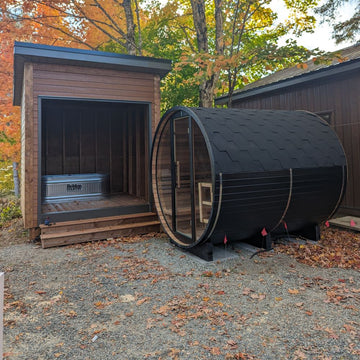Is a Sauna Good For a Cold? Comprehensive Guide to Using a Sauna When Sick

Can I Use a Sauna When Sick?
A Comprehensive Guide to Combating a Virus, Cold or Flu by Boosting Your Immune System with a Sauna

In the constant struggle against the common cold and flu, could your secret weapon be as simple as a sauna session? From ancient civilizations to modern-day wellness enthusiasts, the sauna has remained a staple for its potential health benefits. But can it truly offer relief when you're battling cold and flu symptoms? Let's embark on a journey through the world of saunas, exploring their impact on respiratory health, cardiovascular function, and overall well-being.
Recent findings from the Centers for Disease Control and Prevention shed light on a concerning trend: cold viruses are extending their seasonal grip well into spring. While the winter months traditionally herald the peak of cold and flu season, these viruses seem determined to linger even as the weather transitions. This means that while you may be more accustomed to battling colds in winter, you're not immune to their effects anytime the weather shifts.+
Understanding Different Types of Saunas:
Before we dive into the specifics, let's take a moment to understand what a sauna is all about. Saunas come in various forms, but they all share the same basic principle: heat therapy. Whether it's a traditional dry sauna, an infrared sauna, or a steam sauna, the goal is to expose your body to elevated temperatures in a controlled environment. This heat induces sweating, promotes relaxation, and may offer a range of health benefits.
Here's a brief overview of the different types of saunas:
| Type of Sauna | Description |
|---|---|
| Traditional Sauna | Utilizes dry heat generated by rocks or heaters. Temperature typically ranges from 160°F to 200°F. |
| Infrared Sauna | Emits infrared light to heat the body directly, operating at lower temperatures (usually around 120°F). |
| Steam Sauna | Produces steam by pouring water over hot rocks or using a steam generator, creating a humid environment. |
The Sauna Experience When Sick with a Common Cold
Picture this: you're sniffling, sneezing, and feeling utterly miserable with a cold or flu. The thought of stepping into a sauna might seem both enticing and terrifying. But is it safe to use a sauna when you're sick? Let's weigh the pros and cons:

Pros of Sauna Use When Sick:
- Temporary relief from congestion and cold symptoms.
- Soothing warmth that may alleviate sore throat discomfort.
- Promotes relaxation, reducing stress and promoting restful sleep.
Cons of Sauna Use When Sick:
- Risk of dehydration due to increased sweating.
- Elevated body temperature that may exacerbate fever symptoms.
- Potential for dizziness or nausea, especially in individuals with compromised health.
Exploring the Health Benefits of Using a Sauna When Sick to Boost Your Immune System
Now, let's delve into the potential health benefits that saunas offer, especially concerning cold and flu symptoms:
Cardiovascular Health: Regular sauna sessions have been associated with improved cardiovascular function. The heat causes blood vessels to dilate, which reduces blood pressure and enhances circulation. This increased blood flow delivers oxygen and nutrients to tissues throughout the body, promoting heart health and overall well-being.
Immune System Support: Sauna therapy may help boost your body's natural defense mechanisms, making you more resilient against cold and flu viruses. The heat stimulates the production of white blood cells, which play a crucial role in fighting off infections. Additionally, sweating in the sauna can help eliminate toxins from the body, further supporting immune function. According to information from Johns Hopkins Medicine, various factors like not eating well, smoking, drinking too much alcohol, and having certain health issues like diabetes, HIV, and AIDS, can weaken your immune system. When your immune system is weakened, you're more likely to get sick.
If you're looking to maintain your overall well-being and give your immune system a boost, sauna therapy might be worth considering. When you subject your body to the heat of a sauna, it prompts several physiological reactions. Studies indicate that this temporary increase in body temperature creates a fever-like condition, stimulating the production of white blood cells and lymphocytes. These cells play a crucial role in defending your body against harmful pathogens and viruses, potentially speeding up your recovery from illnesses.
Respiratory Benefits: The steam and heat in saunas can help open up congested nasal passages and relieve respiratory symptoms associated with colds and flu. Inhaling hot steam can soothe irritated airways and promote easier breathing, providing welcome relief for those suffering from respiratory congestion.

Choosing the Right Sauna:
Selecting the perfect sauna for your needs requires careful consideration. Here are some key factors to keep in mind:







